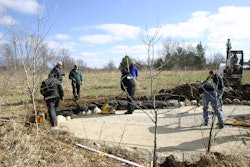
After several years of pulling their hair out over vicious price competition, most landscape contractors went into this year saying their biggest challenge would be finding employees. To some that is hard to understand—given the millions of Americans still out of work, particularly younger people. To landscape contractors, though, finding reliable labor has been a huge problem for decades.
The labor problem is not unlike another challenge landscapers face: the weather. It's not going to go away, and you can't control it. But you can do your best to manage it.
One good way to manage the labor problem is to put a year-long, multi-faceted employee recruitment strategy into place. Too many contractors wait until they desperately need to fill a hole on their team, drop an ad in a local newspaper for a week, and then wonder why they don't draw any decent candidates.
Here are four important things to keep in mind when devising an employee recruitment strategy for your company:
- Recruit all year long, to some degree, using certain "soft" tactics continually while adding other "hard" tactics when you're specifically looking to hire
- Understand that all positions in your company are not the same and, thus, may require different recruitment tactics
- Use a variety of recruitment tools, many of which won't cost much
- You have to sell YOUR company – the prospective applicant is a prospective client in this regard
Underutilized employee recruitment tactics
Tony Bass of Super Lawn Technologies is an expert on finding, training and retaining employees. One of his several published works is entitled, "50 ways to find, recruit, hire and retain superstar employees." In it Bass discusses several employee recruitment tactics that often work well for landscaping companies. Here's a look at some of them.
Flyers. These are relatively inexpensive and easy to produce, but can be highly effective. Hang one outside your office and in high-visibility spots at your facility, such as by the time clock, outside the bathroom, in the break room, etc. Doing so reminds employees that you are looking to hire. Many will be encouraged to pass the word along to friends and family. Also, people visiting your office will see that you're looking for help, and will likely help pass the word along as well.
Give copies of your help-wanted flyer to your vendors. Local realtors are another good source; they know when people are moving into town looking for work. Hang the flyers up around town; restaurants, churches, apartment complexes, laundry mats, equipment dealerships, grocery stores, gas stations and fitness centers represent good venues. Ask permission first, of course.
Help Wanted Signs. Like flyers, these can be relatively inexpensive but effective. Make up a couple signs—one to stake out in your facility's front lawn and one to magnetize to the side of your truck. Be sure to include your phone number.
Business Cards. Ever notice how the back of a business card is typically blank? That's a prime opportunity to advertise that you are always recruiting new talent. On that note, always be handing out these cards as you meet new people in the community.
Your Website. Most landscape companies that have decent websites now include a careers page of some kind. Understand that this page is being used to "sell" your company, not just list job openings. Also, be sure to include a phone number, not just an application form the person is supposed to fill out. You want to make it as easy as possible to get in touch with you.
Host a Job Fair. This one will take some preparation, so pick a day well in advance. The goal is to invite people in to learn more about embarking on a career with your company. So you'll want to prepare a presentation of some kind along with some handouts and refreshments. If you don't have an adequate facility to host the job fair, consider renting space at a local hotel, for instance.
Promote this event on your website and social media channels. Local media may also help you get the word out. So write up a good press release and send it off—which leads to our next underutilized tactic.
Free PR. Writing press releases for local media can help landscape companies not only build up their brand names, but also attract job applicants. Don't hesitate to write news releases talking about your community involvement, achievements, growth and job creation. Local companies "on the move" make interesting stories these days. Just don't make it sound too much like a boastful commercial. Keep it newsy and useful for the audience.
Local Schools. There has been a lot of talk in recent years about the slashing of various vocational programs across the country—and the subsequent decline in landscape-related program enrollment. While that is largely true, that doesn't mean landscape companies should neglect schools as a potential source for new employees.
First of all, a renewed push for vocational programs is starting to emerge as it becomes more apparent that certain industries are in desperate need of workers. If more landscape companies begin to stress their need to local officials, perhaps more young people will be encouraged to look into landscaping-related careers. Start building rapport with counselors at local high schools, community colleges, tech schools and even four-year colleges.
Secondly, just look at the current unemployment situation. The unemployment rate for people under 25 is nearly double the national rate (BLS, May 2014). In other words, young people are looking for work. Will a 22- or 25-year-old with a business degree take a job as a crew laborer? Maybe ... IF they see an opportunity to grow and advance their career in your company. When recruiting young folks today, you have to outline a roadmap to prosperity for them.
Online job boards
Speaking of younger folks, they are much more likely to come across a job opening on their mobile phone or laptop than a newspaper's classifieds section. In today's environment, you must utilize online job boards. There are plenty to choose from. Here's a quick list of some of the most popular:
- Monster
- CareerBuilder
- SimplyHired
- Indeed
- Craigslist
- Glassdoor
- ZipRecruiter
Another good source—particularly for management, administrative and sales/marketing candidates—is LinkedIn, the professional networking social media site. On the topic of social media, TweetMyJobs is a slick website/app that recommends specific types of jobs to users. Job seekers just offer up a list of criteria to customize the recommendations they receive, while also specifying how they want to receive those alerts (text, email, Twitter).
What about Military vets?
There have been some federal tax incentives in place to encourage the hiring of Military veterans returning from Iraq, Afghanistan and elsewhere. Those credits—including the Work Opportunity Tax Credit (WOTC) and Returning Heroes and Wounded Warriors tax credit—expired at the end of 2013. However, other incentives and programs often exist at the state level.
Regardless, hiring veterans of our Armed Forces often makes good sense for a variety of reasons. Visit dol.gov/vets for more information on how to locate veterans in your area, or contact your state's Director for Veterans' Employment and Training (DVET) or Department of Workforce Development.
Final thoughts on recruiting employees
Employment agencies, state landscape associations and national associations like PLANET can also be good sources for job candidates. So is the H-2B seasonal guest worker program, despite its challenges over the past few years.
Here are a few more tips and insights to think about.
Work your existing contacts. Let your vendors, clients, business associates and other contacts in the community know that you're looking for fresh talent. They are often a source for high-quality leads.
"Unconventional" candidates. People often think of landscaping as a young man's occupation. But don't ignore retirees, women, or the hearing-impaired. Many would enjoy this type of work—particularly when working for an awesome company—even on a part-time basis. Also, pay attention to companies in your area that are laying people off. You'll be competing against unemployment benefits, but now that benefits generally run out in six months, it could be a whole different ballgame when recruiting these displaced workers.
Be careful with your competitors. Recruiting employees away from your competitors seems to be a logical thing to do. After all, you know those folks have landscape experience and must enjoy this type of work or they wouldn't be doing it in the first place. But this can be a dangerous practice.
Think about it. When you recruit an employee away from a competitor, there's a good chance you'll have to pay them more than they are already getting. That means there's a chance you'll have to pay them more than you're paying your existing employees. That can turn into an explosive situation! And who's to say this employee won't pull the same "pay me more or I'm leaving" tactic on you a year from now?
That doesn't mean it's a bad idea to hire people who've worked for your competitors. It's just a questionable tactic to try and steal them away. If you're focused on creating a company that is awesome to work for, your competitors' people—along with many others—will naturally gravitate to you over time. That's what all-year recruiting is all about.


![Doosan Bobcat Wacker Neuson Stack 2ec Js Pb V6e[1]](https://img.greenindustrypros.com/mindful/acbm/workspaces/default/uploads/2025/12/doosan-bobcat-wacker-neuson-stack2ecjspbv6e1.CPyyz8ubHn.png?auto=format%2Ccompress&bg=fff&fill-color=fff&fit=fill&h=100&q=70&w=100)








![Doosan Bobcat Wacker Neuson Stack 2ec Js Pb V6e[1]](https://img.greenindustrypros.com/mindful/acbm/workspaces/default/uploads/2025/12/doosan-bobcat-wacker-neuson-stack2ecjspbv6e1.CPyyz8ubHn.png?ar=16%3A9&auto=format%2Ccompress&bg=fff&fill-color=fff&fit=fill&h=135&q=70&w=240)








